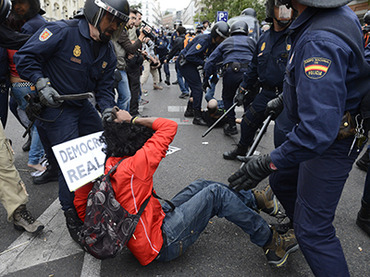By: Stewart Brennan
World United News
http://worldunitednews.blogspot.com/Western leaders have come out publicly in support of Israeli military attacks on the people of Gaza by either stating so for the record or by staying silent. Both positions show total support for Israel’s crimes of mass murder and should be addressed immediately be the people of each nation.
Mass Murder Approved by Your Government:
Video Source: Wesam Alwesam
شاهد ياعالم جرائم ومجازر الصهاينه ضد اطفال فلسطين - غزه http://www.youtube.com/watch?v=8y3jLKdJSF4 When your government gives their blessing for another country to commit mass murder of men, women and children, it means that they would have no problems doing so on the population within their own country, or sections of it. Let us not forget that these Western Nations are the very same countries that spoke of humanitarian aid to the people of Iraq, Afghanistan, Libya, and Syria but instead approved a coordinated bombing campaign or provided the weapons and funding to hired terrorists from Saudi Arabia, Qatar, and other autocratic states to do the job for them. Such is the case in Syria and to a large extent, also in Libya back in 2011. However, in the case of Libya, western countries took an active role in bombing the Libyan people into the Stone Age, where once a thriving population lived in peace and prosperity. Today Libya lays in ruins with our freedom and liberty banks imposing massive debt for the destruction they caused. Nothing will be repaired and no one will receive justice as is the case in Iraq, and Afghanistan.
In Syria, the same western nations are training, funding and giving weapons to their hired thugs to completely destroy the country as they have launched a full scale bombing campaign on the Syrian population. Now the same western countries are in full support of wiping out the entire nation of Palestine especially Gaza where 1.5 million people are imprisoned and suffer occupation and blockade by the murderous regime of Israel.
History Repeats from Warsaw to Gaza:
Gaza’s resistance can be compared to that of the Jewish people in the “Warsaw Ghetto” Poland in World War II, where Jewish resistance challenged the maniacal occupiers and oppressors of their day. Today in Palestine, the same situation is faced by the people of Gaza where resistance by an imprisoned population is met by the brute force of a maniacal Zionist oppressor and a madman bent on starting wars all over the Middle East…and your government supports this Israeli Madman Netanyahu and his regime that pushes “Ethnic Cleansing.”
Video Source: World United News
Crimes Against Humanity, Yesterday and Today
http://www.youtube.com/watch?v=g0XymauBqgEWould you trust your government to make moral and ethical decisions on your behalf?
Western Governments are morally bankrupt and cannot be trusted to do anything honest or ethical because they approve of the most horrendous of crimes against humanity, “War” and “Ethnic Cleansing”.
Put yourself in the position of the Palestinian people, imagine if your community or country is occupied by a foreign nation where you are surrounded by an aggressive military blockade by land, sea, and air and where survival depends on tunnels to maintain the lives of your children or the few trucks of food allowed in for minimal subsistence living…you have no means to take care of anyone and when your children get sick there is no medicine to take care of them. If you go to the border and complain you risk being shot and killed by a ruthless Israeli military that is of the opinion that you are nothing but animals and deserve what you get. When anyone resists the occupation the whole community is subject to massive destruction by military attack campaigns. If your citizens manage to fire a few bullets back at them, you’re labelled terrorists by the leaders of the international community where the permission to attack is given to the occupier.
Being Irish decent and coming from 700 years of oppression, I understand the mental anguish that the people of Gaza are experiencing and like my ancestors before me, the Palestinian people have a moral right to fight for their freedom even if the odds are decidedly against them by one of the World’s largest military killing machines. What is terrorism but a label used by an occupation force on those that resist occupation?
Your leaders are backing the mass murder and ethnic cleansing of Palestine. How do you feel about that?
What will you do?
The next time I bump into anyone that sides with the Zionist agenda, I will ask them to look into their children’s eyes and tell them that they support the slaughter of innocent women and children…I will also question their ethics or logic and ask them if it is because their Television tells them to back Israeli ethnic cleansing of Palestine, is it because they support their political leaders no matter what they do, or because they just side with mass murder?
My advice to anyone that will listen…get up and oppose Israel and anyone that stands with them with every fibre of your being. Use common sense, moral and ethical positions, human rights, and empathy for your fellow mankind because if you do not, the events that happen in Palestine will come back in ways you never imagined. As goes Palestine, so goes the rest of the World.
Tell your political leaders to "fuck off" and just “Stop the Ethnic Cleansing of Palestine by Israel!” You have to get really mad!!
Free Palestine!!
-----------------------
Video Links:
Crimes Against Humanity – Yesterday and Today
http://www.youtube.com/watch?v=g0XymauBqgEOcupation 101
http://www.youtube.com/watch?v=K_jvXnPG9XcCoalition of Demons Attacking Libya (June 15, 2011)
http://www.youtube.com/watch?v=qNLqQ2cN-PACurrent News in Libya – World United News
http://www.youtube.com/watch?v=pHzQBYl1J9oLibya News Archive (2011 – 2012) – World United News
http://www.youtube.com/watch?v=Ba3ZXRJDGY8&feature=share&list=PL4A3B9AE5B4261A3BPalestine News Archive – World United News
http://www.youtube.com/watch?v=0cG9OR2ofBgSyria News Current – World United News
http://www.youtube.com/watch?v=3896i8coaZESyria News Archive (2011 – 2012) – World United News
http://www.youtube.com/watch?v=Sn1so6EusP8


































